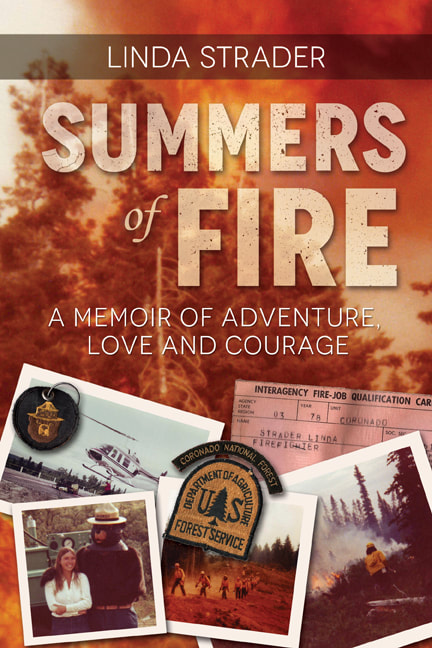| Originally from Syracuse, New York, Ms. Strader moved to Prescott, Arizona with her family in 1972. In 1976, she became one of the first women on a U.S. Forest Service fire crew in the Santa Rita Mountains south of Tucson. Summers of Fire: A Memoir of Adventure, Love and Courage is her first book, scheduled for publication on May 1st, 2018 by Bedazzled Ink Publishing. She is currently working on a prequel. In addition to writing, Ms. Strader is a landscape architect, certified arborist, and watercolor artist. She currently lives in the same area where her Forest Service career began. |
Writing the Tough Stuff in Memoir
A myriad of reasons exist for writing a memoir. For example, the author may have led an interesting or challenging life, or experienced a wonderful adventure. If you have decided to write a memoir about a particularly difficult time in your life, this might be a bit harder. Maybe you’ve heard that by telling your story, you will be able to let go of things: people, places or events that have troubled you. Or maybe you believe your story can help someone else going through the same or similar circumstances—give the reader hope: “If she made it through, so can I.”
Whether you have not yet started to write your story, or you are in the middle and finding it tough to move forward, sharing what I learned while writing my memoir may help you. I faced some unpleasant experiences and relived others that I would have preferred not to.
Do NOT use writing memoir to seek revenge. Not that I even thought about going there in my story, but trust me, this is not a good idea. It will put you in a very unpleasant light, even if you have a right to feel that way. No one enjoys reading about someone trashing another, even if said “other” deserves it.
Is it necessary to write a particular scene? Sometimes going into morbid details is not necessary, and may end up turning a reader off. Take a step back and ask yourself, “Is it really necessary to add this part, or can I show this in another way to get my point across?”
For example, writing a knock-down-drag-out-fight with every fist-blowing account may not work. Is there another way to show what happened?
Be prepared. Reliving difficult and emotional events can trigger responses you may not anticipate. If you think writing about these might bring on panic attacks or anxiety, definitely elicit the help of a professional to help you through. Friends might not get why you are putting yourself through the torture—most of mine did not. I am grateful to have been able to share with my therapist particularly upsetting sections, which helped me cope.
Don’t stress out over hurting people’s feelings. You’ll see this is a hot topic in the memoir writing world. The way I see it: if someone doesn’t like the way I portray them, then they should have been nicer to me. Worried about a lawsuit for defamation of character? If you are telling the truth, not embellishing or making things up, from what I’ve read in reputable writer oriented magazines, is they would be hard-pressed to win a lawsuit. And seriously—who can afford to go to the expense? That being said, if you are really, really worried: hire an attorney specializing in this to ease your concerns.
Not everyone will relate. Even bestselling memoirs receive negative reviews from readers who did not relate. That does not mean your story has no value.
You might not feel better having written the ‘tough stuff.’ The general assumption is that once you ‘get it all out’ you will feel better. That may be…but do not be surprised if that does not happen. I did not feel better, and each time I had to return to sections for editing, I suffered another meltdown.
Be kind to yourself. I often had to just walk away from writing about things that were upsetting. Give it time. Lots of time. Sometimes I’d be forced to use place-markers. In other words, I’d write something that I knew wasn’t quite what I wanted to say, and let it go until I was up to editing. Particular sections were much easier to deal with days, if not months down the road.
And then there is soliciting help from others. While this is not a bad thing, the danger is you may feel obligated to make changes, even if they don’t feel quite right. After attending my local writers group weekly for over a year, receiving accolades from the group and taking suggested edits in stride, it was the comment from a member that made me rethink why I continued to attend. Referencing a rather humorous (I thought) event in my story, she said, “I can’t believe you were that stupid.” I never went back, and never regretted not going back.
The decision to write a memoir that dives into difficult times should not be taken lightly. The reality is those events can trigger serious mental and emotional trauma. If you are committed to telling your story regardless, keep in mind that it is okay to let yourself grieve.
And finally, let me leave with this: You can’t please everyone. There will be those who will not want to read what you have to say. There will be some who will relate to and praise your writing. When it’s all said and done, write your truth, and do not let anyone tell you that you must do otherwise.
A myriad of reasons exist for writing a memoir. For example, the author may have led an interesting or challenging life, or experienced a wonderful adventure. If you have decided to write a memoir about a particularly difficult time in your life, this might be a bit harder. Maybe you’ve heard that by telling your story, you will be able to let go of things: people, places or events that have troubled you. Or maybe you believe your story can help someone else going through the same or similar circumstances—give the reader hope: “If she made it through, so can I.”
Whether you have not yet started to write your story, or you are in the middle and finding it tough to move forward, sharing what I learned while writing my memoir may help you. I faced some unpleasant experiences and relived others that I would have preferred not to.
Do NOT use writing memoir to seek revenge. Not that I even thought about going there in my story, but trust me, this is not a good idea. It will put you in a very unpleasant light, even if you have a right to feel that way. No one enjoys reading about someone trashing another, even if said “other” deserves it.
Is it necessary to write a particular scene? Sometimes going into morbid details is not necessary, and may end up turning a reader off. Take a step back and ask yourself, “Is it really necessary to add this part, or can I show this in another way to get my point across?”
For example, writing a knock-down-drag-out-fight with every fist-blowing account may not work. Is there another way to show what happened?
Be prepared. Reliving difficult and emotional events can trigger responses you may not anticipate. If you think writing about these might bring on panic attacks or anxiety, definitely elicit the help of a professional to help you through. Friends might not get why you are putting yourself through the torture—most of mine did not. I am grateful to have been able to share with my therapist particularly upsetting sections, which helped me cope.
Don’t stress out over hurting people’s feelings. You’ll see this is a hot topic in the memoir writing world. The way I see it: if someone doesn’t like the way I portray them, then they should have been nicer to me. Worried about a lawsuit for defamation of character? If you are telling the truth, not embellishing or making things up, from what I’ve read in reputable writer oriented magazines, is they would be hard-pressed to win a lawsuit. And seriously—who can afford to go to the expense? That being said, if you are really, really worried: hire an attorney specializing in this to ease your concerns.
Not everyone will relate. Even bestselling memoirs receive negative reviews from readers who did not relate. That does not mean your story has no value.
You might not feel better having written the ‘tough stuff.’ The general assumption is that once you ‘get it all out’ you will feel better. That may be…but do not be surprised if that does not happen. I did not feel better, and each time I had to return to sections for editing, I suffered another meltdown.
Be kind to yourself. I often had to just walk away from writing about things that were upsetting. Give it time. Lots of time. Sometimes I’d be forced to use place-markers. In other words, I’d write something that I knew wasn’t quite what I wanted to say, and let it go until I was up to editing. Particular sections were much easier to deal with days, if not months down the road.
And then there is soliciting help from others. While this is not a bad thing, the danger is you may feel obligated to make changes, even if they don’t feel quite right. After attending my local writers group weekly for over a year, receiving accolades from the group and taking suggested edits in stride, it was the comment from a member that made me rethink why I continued to attend. Referencing a rather humorous (I thought) event in my story, she said, “I can’t believe you were that stupid.” I never went back, and never regretted not going back.
The decision to write a memoir that dives into difficult times should not be taken lightly. The reality is those events can trigger serious mental and emotional trauma. If you are committed to telling your story regardless, keep in mind that it is okay to let yourself grieve.
And finally, let me leave with this: You can’t please everyone. There will be those who will not want to read what you have to say. There will be some who will relate to and praise your writing. When it’s all said and done, write your truth, and do not let anyone tell you that you must do otherwise.













